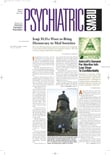The use of tax credits, as proposed by the Bush administration and others, would not make much progress in solving the problem of the millions of Americans who have no health insurance, according to a recent analysis by James Reschovsky and Jack Hadley, health policy analysts at the Center for Studying Health System Change.
In a report titled “The Effect of Tax Credits for Nongroup Insurance on Health Spending by the Uninsured,” the authors said that tax-credit proposals also would “hit older and sicker Americans hardest, in terms of raising their spending for health care and health insurance.” The article is a January/February exclusive on the Health Affairs Web site.
An earlier analysis by Karen Pollitz, project director of Georgetown University’s Institute for Health Care Policy and Research, found considerable restrictions and obstacles for a hypothetical woman with situational depression in terms of obtaining nongroup health insurance (Psychiatric News, April 5, 2002).
Reschovsky and Hadley compared how much low-income uninsured people spend now out of pocket for health care with predictions of how much they would spend if they took advantage of a tax credit.
Recipients of tax credits would use the funds to buy nongroup insurance policies, which “tend to have greater cost sharing and more limited coverage than the typical employer-sponsored policy,” according to the authors.
Nongroup coverage typically is more expensive than most group insurance, because of higher costs to the insurance companies for marketing and underwriting.
In addition, the level of premium costs for nongroup insurance is more closely linked to requirements for cost sharing and degree of coverage and to risk factors such as age and health.
The result is that if purchasers of nongroup insurance were able to find relatively low premiums, those savings likely would be offset by other costs.
The authors generated four estimates: size of the tax credit under alternative assumptions about tax credit structure; nongroup insurance premiums; out-of-pocket expenditures for services for those with insurance using the tax credit; and out-of-pocket expenditures for the uninsured.
Their analysis showed that “nearly all eligible uninsured people would pay higher health-related costs if they took advantage of tax credits of the size considered in the Bush proposal and other recent proposals.”
The authors pointed out, however, that those in their analysis who opt to use the tax credits would receive more health services than those who remain uninsured.
“The Effect of Tax Credits for Nongroup Insurance on Health Spending by the Uninsured” is posted online at www.healthaffairs.org. ▪
